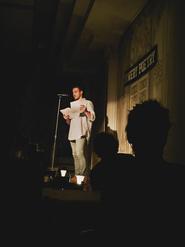
John Rufo ’16 is taking poetry beyond the personal and into the political this summer with an Emerson project titled “Hybrid Forms, Hybrid Voices: A Creative Study of Contemporary Political Poetics.”
Rufo is investigating the manner in which contemporary poets address and develop topics of race, gender, sexuality and disability through “hybrid poetics.” However, he claims, the term “hybrid poetics” is difficult to concretely define, and attempting to do so has become one of the focal points of his project. “When one defines a poet’s work as ‘hybrid’ it typically means something like ‘cross-genre,’” he explained, “but it can also indicate that a poem simply doesn’t “look” the way we typically expect a poem to look.” To Rufo, simple visual distinctions such as a poem being unaligned with the left-hand margin, a construction based on prose-blocks as opposed to traditional line structures, or the incorporation of photographic elements do not by default categorize a poem as hybrid.
“Just because a poem “looks” different does not mean it’s necessarily “experimental” or boundary-pushing,” he said. Instead, Rufo places a great deal of importance on content over structure when assessing hybridity. He argues that even the most traditionally structured poem can cause a reader to radically re-examine their definitions and conceptions of poetry, provided the ideas present within the work are sufficiently stimulating. Rufo is working with Visiting Assistant Professor of Literature and Creative Writing Andrew Rippeon.
Rufo’s methodologies in pursuing the answers he seeks are largely based in reading and writing, with a wide ranging pool of authors and thinkers to research. Rufo and Rippeon have been selecting works to examine for the project as far back as late April, and considered texts by such wide-ranging authors as Kamau Brathwaite, Fred Moten, Claudia Rankine, Jennifer Bartlett and the Mongrel Coalition Against Gringpo (an anonymous collective), among many others. Of particular interest were poets whose work included both critical writings/theory and poems, as well as those who did not differentiate between their critical work and their poetry.
Additionally, Rufo has been making the most out of his summer internship with D.T. Max, a writer for The New Yorker, in New York City. Attending as many poetry readings as time allows, he has had the chance to hear a great number of poets relevant to the Emerson project, including Amber Atiya, Natalie Eilbert, Amy King and others.
Rufo’s interest in this course of study was born from a deep-seeded love of poetry, but also from his commitment to issues of social justice. “In some ways, we’re living in an incredible era; however, in other ways, it’s a total nightmare,” he remarked.
“You don’t have to wait a single day to hear about another instance of killing, another act of oppression, another way in which the systems of which we’re a part are methodically dismantling us.” Poetry, he argues, is one way to explore these sociopolitical themes, but that too often poetry that seeks to tackle important issues becomes rejected by the predominantly white “experimental canon.” Rufo commented, “It’s insane that poetry as a field would imitate the power structures in place in American society — Yet here we are. As a person who’s deeply critical of those systems, my project stands as both personal and political.”
That is a deceptively simple, yet incredibly important point, said Rufo. Experimental poetry is, in many ways, inherently political. “By experimenting with language, the poet questions authority,” he noted, concluding that “the biggest lie is that you can write poetry apolitically or without context.”
Posted August 6, 2015
 Read more
Read more 